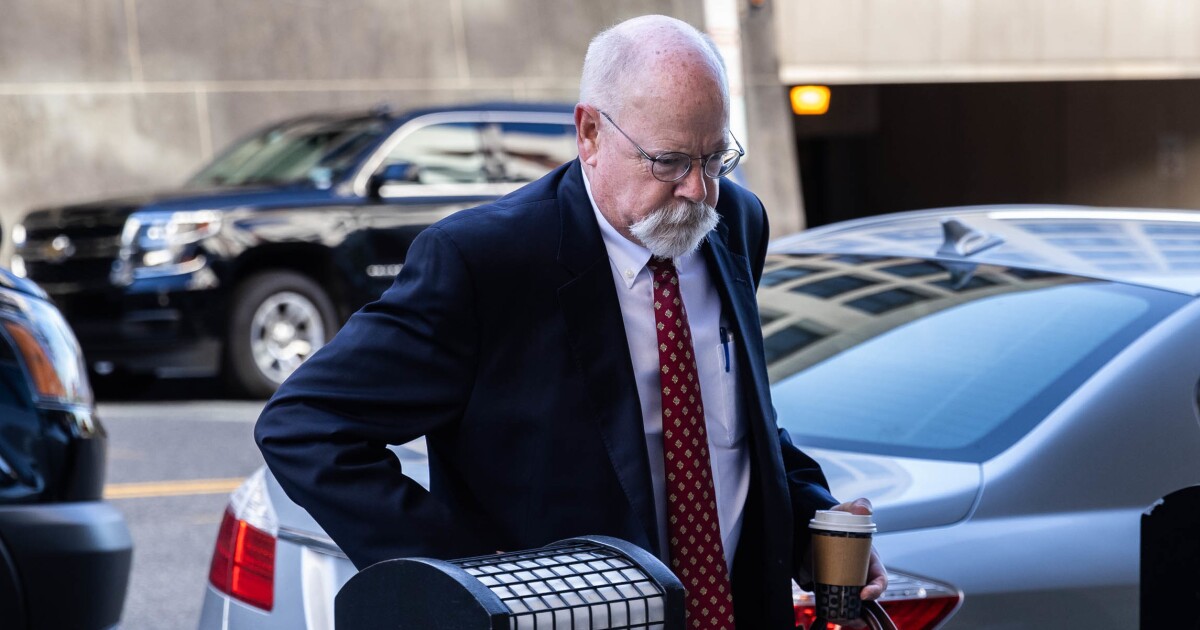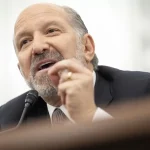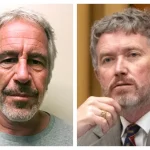

John Durham’s special counsel office released its most recent financial statement just days after a defeat in the criminal investigation’s first trial as the prosecutor is gearing up for his next trial centering on Christopher Steele’s discredited dossier.
From the start of October 2021 to the end of March 2022, the Special Counsel’s Office spent a total of $1,656,466, a slight decrease from the second report released last year, according to the new financial statement, which is the third one released by Durham’s office. Of the total for the new reporting period, almost $767,000 was spent on personnel compensation and benefits, with $161,890 going to travel, $590,264 on contractual services, $6,144 on supplies and materials, and $131,228 on rent, communications, and utilities.
Of the salaries paid, $101,127 were spent on employees of the special counsel’s office, and $665,813 were spent on DOJ employees detailed to the office. The breakdown of contractual services was $303,226 for litigation support and around $287,000 for information technology.
STEELE DOSSIER SOURCE CASE IS DURHAM’S NEXT TEST
Components of the Justice Department supporting the special counsel’s office tracked their spending related to helping Durham’s investigation, and “the expenditures for this period totaled $335,210,” the department said.
A review by the Justice Management Division’s Internal Review and Evaluation Office “identified no material weaknesses or significant deficiencies in the design or operation of SCO controls.”
Igor Danchenko, a Russian-born lawyer and researcher who has lived and worked in the United States for years, was charged in November 2021 with five counts of making false statements to the FBI regarding the information he provided to Steele for the dossier, according to Durham. The DOJ’s watchdog said FBI interviews with Danchenko “raised significant questions about the reliability of the Steele election reporting” and concluded Danchenko “contradicted the allegations of a ‘well-developed conspiracy’ in” Steele’s dossier.
Danchenko has pleaded not guilty.
A jury found Democratic cybersecurity lawyer Michael Sussmann not guilty this week on charges, brought in September 2021 by Durham, of concealing his two clients (Neustar chief technology officer Rodney Joffe and Hillary Clinton’s 2016 campaign) from FBI General Counsel James Baker when he pushed debunked allegations of a secret line of communication between the Trump Organization and Russia’s Alfa-Bank in 2016.
Sussmann’s cozy relationship with the bureau, along with efforts by him and a host of Democratic operatives to push Trump-Russia claims to the media, was discussed during his trial. Clinton personally signed off on pushing the Alfa-Bank claims to the media in the summer of 2016, according to her campaign manager.
The second Durham financial report released in December 2021 showed a breakdown of the roughly $1.9 million in expenditures made by the special counsel’s office for the period from the start of April 2021 to the end of September 2021 on personnel, travel, equipment acquisition, and contracts. Another $471,000 was spent by other parts of the Justice Department in support of Durham’s investigation during that time frame. The first report, which covered the period starting from Durham’s Oct. 19, 2020, appointment through the end of March 2021, showed Durham’s office spent roughly $934,000, while DOJ elements supporting the special counsel inquiry spent roughly $521,000. The reports are limited in scope to Durham’s expenditures as special counsel, meaning other costs associated with his work as a U.S. attorney are excluded.
The dossier, created by Steele, who will be in the spotlight during Durham’s next trial, played a “central and essential” role in the FBI’s effort to obtain wiretap orders against former Trump campaign associate Carter Page, Justice Department Inspector General Michael Horowitz concluded in December 2019. Danchenko undermined Steele’s claims of a “well-developed conspiracy” between then-President Donald Trump and Russia in the dossier, which Steele created after being hired by the opposition research firm Fusion GPS, which was itself hired by Perkins Coie and Marc Elias, the general counsel for Clinton’s campaign. Sussmann worked for Perkins at the time too, and both he and Elias met with Steele and Fusion in 2016.
Durham was “authorized to investigate whether any federal official, employee, or any other person or entity violated the law in connection with the intelligence, counterintelligence, or law enforcement activities directed at the 2016 presidential campaigns, individuals associated with those campaigns, and individuals associated with the administration of President Donald J. Trump, including but not limited to Crossfire Hurricane and the investigation of Special Counsel Robert S. Mueller III,” then-Attorney General William Barr’s appointment order said.
While Horowitz argued in December 2019 that Crossfire Hurricane was “opened for an authorized investigative purpose and with sufficient factual predication,” Durham and Barr disputed the notion that the opening of the investigation was justified.
“Our investigation is not limited to developing information from within component parts of the Justice Department. Our investigation has included developing information from other persons and entities, both in the U.S. and outside of the U.S.,” Durham said at the time. “Based on the evidence collected to date, and while our investigation is ongoing, last month we advised the inspector general that we do not agree with some of the report’s conclusions as to predication and how the FBI case was opened.”
Durham’s “investigation into the investigators” has lasted longer than Mueller’s special investigation into alleged ties between the Trump 2016 campaign and Russia, which cost nearly $32 million. Mueller’s inquiry “did not establish” any criminal Trump-Russia collusion.
Attorney General Merrick Garland told lawmakers in October 2021 that Durham had the freedom to continue his investigation.
“We’re now in a new fiscal year, and as everyone knows, Mr. Durham is continuing. So I think you can readily assume that his budget has been approved,” Garland said, adding, “We don’t normally make a statement about those things, but since he’s still in action, the provisions of the regulation which require approval of his budget for the next fiscal year are public, so I think … you would know if he weren’t continuing to do his work.”
Garland noted his support for Durham making his report public, saying: “With respect to the report, I would like as much as possible to be made public. I have to be concerned about Privacy Act concerns and classification, but other than that, the commitment is to provide a public report, yes.”
CLICK HERE TO READ MORE FROM THE WASHINGTON EXAMINER
In February 2021, President Joe Biden asked all Senate-confirmed U.S. attorneys appointed by Trump for their resignations, with U.S. Attorney David Weiss, who is leading a criminal investigation into Hunter Biden, as the sole exception. Durham was asked to step down as the U.S. attorney for Connecticut but was kept on as special counsel for his criminal review of the Trump-Russia investigation.
Durham’s inquiry has led to just one guilty plea, with ex-FBI lawyer Kevin Clinesmith admitting he fraudulently changed the wording of a CIA email to say Page was “not a source” for the agency despite the FBI being informed that Page had been an “operational contact” for the CIA for years.




